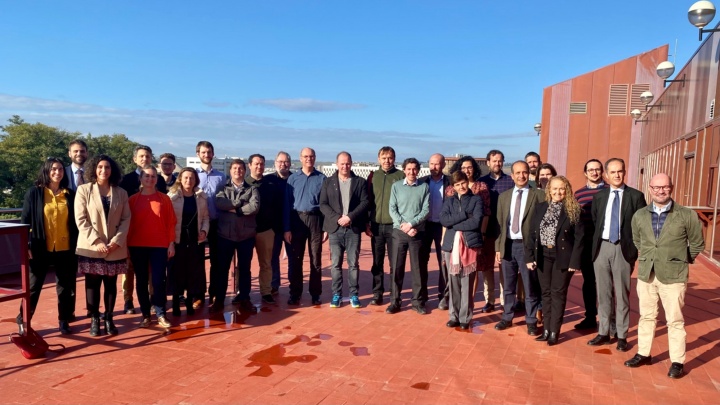The European Union's new Marie Sklodowska Curie project focuses on power generation based on Supercritical carbon dioxide, i.e. CO2, in an aggregate state between gas and liquid. The project is being led by the University of Seville, and involves the Institute of Nuclear Technology and Energy Systems (IKE, led by Prof. Jörg Starflinger) and the Materials Testing Institute at the University of Stuttgart (MPA, Managing Director Prof. Stefan Weihe). The program "Innovation in Supercritical Carbon Dioxide Power Generation Systems" (ISOP) has now begun, with 17 doctoral researchers.
The consortium is comprised of nine industrial beneficiaries, six academic beneficiaries, one associated partner whose action is funded by United Kingdom Research and Innovation (UKRI) and five additional associated partners supporting secondments of the doctoral candidates (see below for details). The project is coordinated by Prof. David T. Sánchez Martínez, University of Seville (Spain), and has a total duration of forty eight months, from January 2023 to December 2026. The total budget is M4.45 €, theirin M0,47 to the University of Stuttgart. M3.84 € are funded by the European Commission and M0.61 € are funded by UK Research an Innovation (UKRI).
The aim of this four-year work programme is to undertake cutting edge multidisciplinary research and development to make a step change in understanding and advancing Supercritical CO2 based power generation systems’ technology. This will enable a step change in the role played by power and heat cycles to become major contributors to achieving the 2050 zero emissions targets. ISOP will achieve this goal while providing specialised training for 17 doctoral researchers, of which the University of Stuttgart will take on three PhD students.
Technical Objectives
The technical objectives of this research are:
- Develop advanced models and design tools that enable the optimal integration of Supercritical carbon dioxide (sCO2) power systems components for various thermal energy sources and end use applications,
- Develop accurate prediction tools for the simulation of transient operation of sCO2 power cycles and investigate innovative concepts of control and optimisation of operation,
- Develop innovative methods to enhance aerodynamic and mechanical performance, reliability, and operability of key system components,
- Develop advanced modelling and experimental methods that enable selection and development of materials, coatings and manufacturing techniques
The project aims to contribute to the EU agenda on European Research Area by training a new generation of creative, entrepreneurial and innovative early-stage researchers” who can face future challenges and to convert knowledge and ideas into products and services for economic and social benefit”. In addition, support to and compliance with the United Nation’s Sustainable Development Goals will be at the heart of the training of the doctoral candidates and the scientific and economic outcomes of this research.
| Contact | Prof. Dr. Jörg Starflinger, University of Stuttgart, Institute of Nuclear Technology and Energy Systems (IKE), Phone +49 711 685 62116, E-Mail Prof. Dr. Stefan Weihe, University of Stuttgart, Materials Testing Institute, Phone +49 711 685 62604, E-Mail |
|---|


